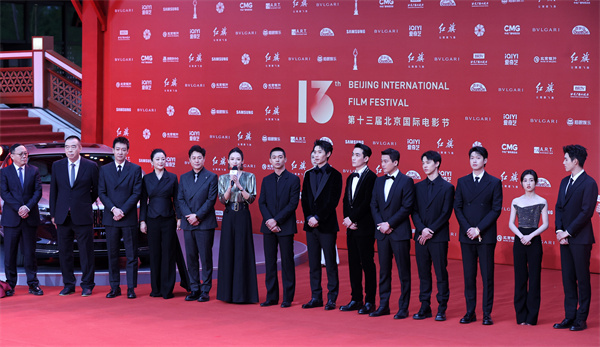

Boosting coproduction
China has signed film coproduction agreements with more than 20 countries, including France, Russia and New Zealand. Prior to the pandemic's impact on the world film industry, China had jointly produced a total of 244 movies with other countries and regions between 2000 and 2019, according to China National Radio.
With the rapid development of the film industry, Chinese filmmakers have transitioned from relying on foreign economic support to produce films in the early 1990s, to now being capable of raising a big budget and investment in coproductions that have a global distribution reach, says Huang, known for serving as the chief producer of The Battle at Lake Changjin, China's highest-grossing film of all time.
As one of the pioneers to explore jointly produced films with foreign filmmakers, the Beijing-based Huayi Brothers Media Corp once cooperated with American studio Columbia Pictures to produce several popular movies, ranging from Feng Xiaogang's directorial effort Big Shot's Funeral (2001) to Jiang Wen-starring martial arts movie Warriors of Heaven and Earth (2003) and Stephen Chow's Kung Fu Hustle (2004).
Wang Zhonglei, cofounder of Huayi Brothers, recalls that their cooperation with Hollywood had brought in money and experience, allowing some of the top-notch Chinese filmmakers to fully unleash their creative potential.
"Back then, as China's film industry was in its early stages, we were relatively unfamiliar with marketing and promotion. I vividly recall being presented with a set of 10 posters by our American collaborators right after wrapping up production on a movie. It was a new and exciting experience for us at the time," says Wang.
The surge of the Chinese economy has given domestic film companies more control and prompted some stellar coproductions with China's neighboring countries due to the cultural affinity in late 2000s, adds Wang.
One of such most influential examples is A Battle of Wits, a 2006 war movie jointly produced by China, Japan and South Korea. According to Wang, the movie is inspired by Mozi, a Chinese philosopher who lived more than 2,400 years ago, and whose stories are also retold in the two neighboring countries, providing a strong foundation for the film to be well-received.
According to some domestic reports, international coproductions have moved toward larger scale and deeper cooperation in recent years, exemplified by phenomenal hits such as Legend of the Demon Cat, one of the highest-grossing Sino-Japanese movies in Japan, and The Meg, the highest-grossing live-action Sino-American movie in North America.
"We have noticed a growing interest from foreign audiences in Chinese cinema. They are curious about why China has developed so rapidly over the past few decades and how Chinese people live in the modern era," says Yang Xianghua, president of iQiyi's movie and overseas business sector.
According to Yang, the streaming platform iQiyi has established overseas branches since 2019 and provided subtitles in 12 languages across over 190 countries and regions. Surprisingly, he discovered that almost 90 percent of the audience in North America who watch Chinese movies are foreigners.